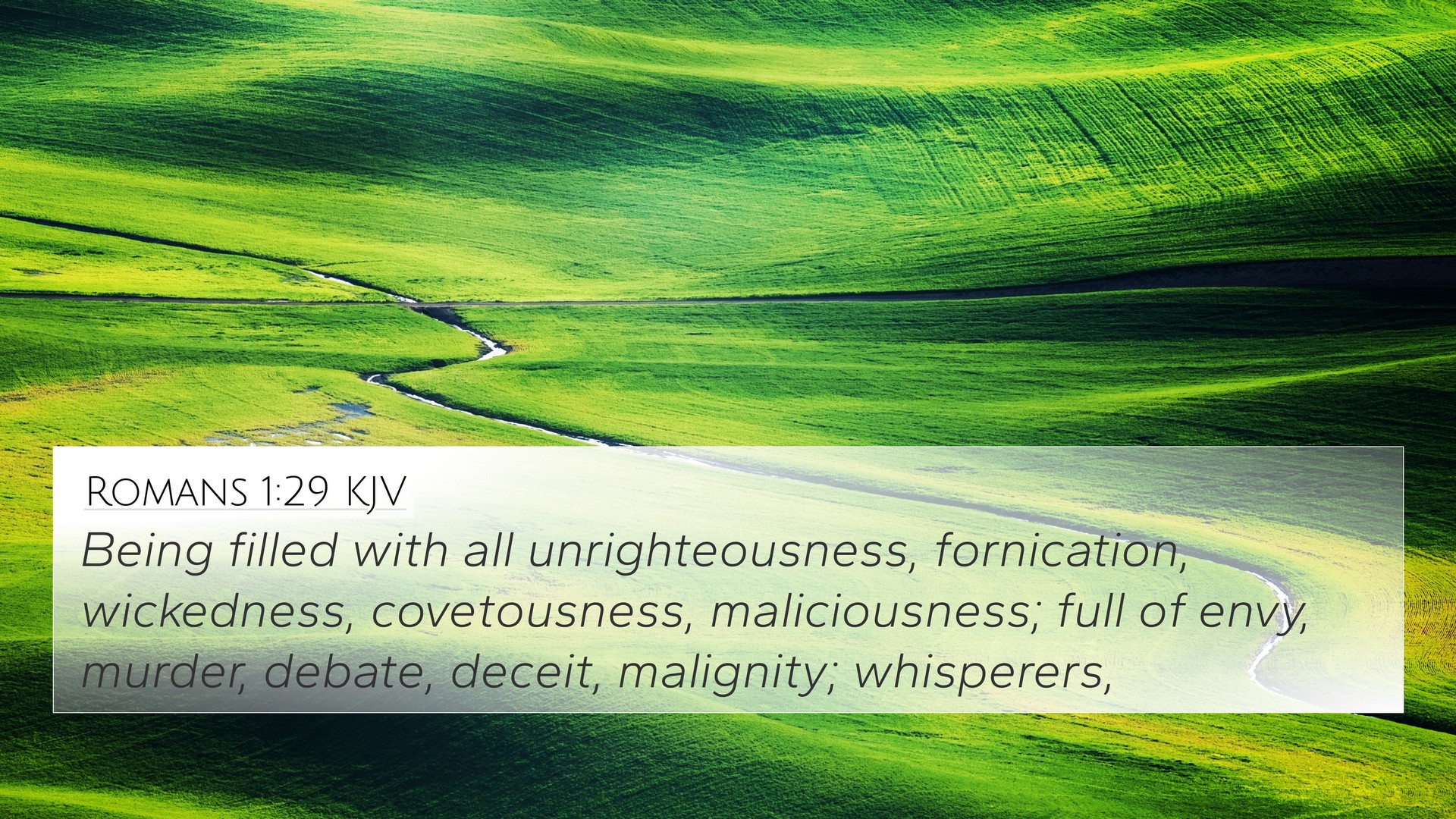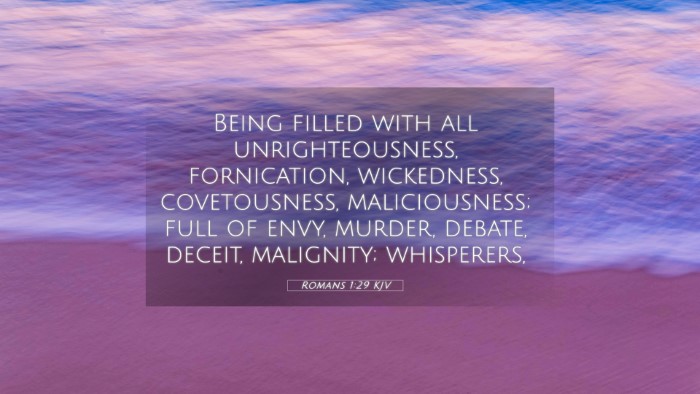Understanding Romans 1:29
Romans 1:29 states: “They were filled with all unrighteousness, wickedness, covetousness, maliciousness; full of envy, murder, debate, deceit, malignity; whisperers.” This verse describes the moral decay of those who have turned away from God, highlighting the various vices that fill their hearts.
The following commentary insights provide a deeper understanding of this passage and its implications.
Summary of Insights from Public Domain Commentaries
Matthew Henry's Commentary
Matthew Henry emphasizes that this verse reflects the overflowing of sin that results from a rejection of God. The list of vices is indicative of a society that has turned its back on moral truths. He explains that these traits are not only individual failings but societal issues that stem from a broader abandonment of divine principles.
Albert Barnes' Commentary
Albert Barnes focuses on the specific terms used in the verse. He points out that each term denotes a peculiar vice: "unrighteousness" reflects moral failure in general, "wickedness" points to cruelty and maliciousness, while "covetousness" illustrates a longing for what others have. He explains that these vices represent a complete moral ruin, born from a deliberate choice to reject God's authority.
Adam Clarke's Commentary
Adam Clarke elaborates on the term "malignity," explaining it as a deep-seated ill-will towards others and a willingness to conspire against them. He notes that the verse presents a stark contrast between the nature of God and the nature of humanity when left to its own devices. Clarke indicates that this moral degradation leads to social decay and spiritual demise.
Key Themes and Cross-References
The themes of unrighteousness and moral decay are prevalent throughout the Scriptures. Here are some relevant cross-references that relate to Romans 1:29:
- Galatians 5:19-21: Lists the works of the flesh, including many of the same vices mentioned in Romans 1:29.
- Ephesians 4:31: Exhorts believers to put away bitterness, wrath, anger, clamor, and evil speaking, similar to the vices in this verse.
- Colossians 3:5: Encourages the mortification of earthly members, which relates to the themes of wickedness and covetousness.
- James 3:14-16: Discusses the bitter envy and self-seeking that leads to disorder, paralleling the moral corruption described in Romans.
- 2 Timothy 3:1-5: Describes perilous times where people embody many of the traits listed in Romans 1:29.
- 1 Peter 2:1: Calls believers to lay aside all malice, deceit, hypocrisy, envy, and slander, echoing the themes in Romans 1:29.
- Proverbs 6:16-19: Lists six things the Lord hates, which include a heart that devises wicked schemes and a false witness, resonating with the motives behind the vices in Romans 1:29.
Detailed Analysis of Vices
Comprehensive Breakdown of Each Vice
The verse contains a list of vices that together portray a complete moral bankruptcy:
- Unrighteousness: Represents a general state of sin and injustice, a failure to uphold right over wrong.
- Wickedness: Indicates malicious and evil intent, highlighting a disposition towards causing harm.
- Covetousness: Describes a greediness for what belongs to others, reflecting a heart devoid of contentment.
- Maliciousness: Denotes the desire to harm others, motivated by ill-will or spite.
- Envy: A resentful longing aroused by someone else's possessions, indicating dissatisfaction with one’s own circumstances.
- Murder: The extreme expression of hatred and sin, marking the depths of moral failure.
- Debate: Suggests contentiousness and strife, a quarrelsome nature that disrupts harmony.
- Deceit: Involves dishonesty and trickery, reflecting a lack of integrity.
- Malignity: Implies deep-seated hatred and ill-will, often manifesting as conspiracy against others.
- Whisperers: Describes those who spread gossip and slander, undermining others’ reputations and relationships.
Connections Between Bible Verses
Understanding Romans 1:29 within the context of other scriptures enhances its meaning. Several biblical passages provide thematic connections and insights:
- 1 John 1:5: States that God is light and in Him is no darkness at all, which emphasizes the contrast between divine nature and human sinfulness.
- Romans 3:23: "For all have sinned and come short of the glory of God," reiterating the universality of sin described in Romans 1:29.
- Matthew 15:19: Jesus speaks about heart issues, stating that out of the heart come evil thoughts and actions, aligning with the inner corruption reflected in Romans.
- Philippians 4:8: Provides a directive on what to think about, contrasting the virtues believers should pursue against the negative vices in Romans 1:29.
Using Cross-References for Deeper Study
Engaging in a cross-referencing Bible study can deepen your understanding of Romans 1:29. Here are some tools and methods:
- Bible Concordance: A tool that allows you to find specific verses and concepts quickly, enabling efficient cross-referencing.
- Bible Cross-Reference Guide: Use guides that list related verses thematically, helping to identify connections across different books.
- How to Use Bible Cross-References: When studying a verse, take note of cross-referenced passages to build a broader understanding of the theme.
- Cross-Referencing Bible Study Methods: Methods like thematic studies or literary analyses can reveal connections between verses.
- Bible Reference Resources: Utilize printed and digital resources that focus on cross-referencing verses and topics.
Thematic Bible Verse Connections
Examining the themes within Romans 1:29 in relation to other scripture leads to thematic connections:
- Moral degradation: Explored in passages like Isaiah 59:2-3 and 2 Timothy 3:1-5.
- The danger of unchecked sin: Highlighted in James 1:14-15, showcasing how desire leads to sin and eventual death.
- God’s call to righteousness: Seen consistently throughout both Old and New Testaments, providing a backdrop for understanding moral failings.
Conclusion
Romans 1:29 serves as a sobering reminder of the consequences of rejecting God's truth. By cross-referencing this verse with others, believers can better understand the nature of sin and its impact on both individual lives and society. Engaging with the scriptures thematically enriches one’s study and comprehension of Biblical teachings, encouraging a pursuit of righteousness.
Further Exploration
For those wanting to delve deeper into the connections, thematic studies, and the implications of Romans 1:29, a comprehensive approach utilizing biblical texts, cross-referenced themes, and scholarly commentaries can be highly beneficial. Access to resources that track the links between various passages enhances the understanding of unity in Scripture and its call to moral living.







